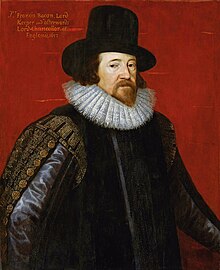
Back Francis Bacon (wetenskaplike, 1561) AF ፍራንሲስ ቤከን AM Francis Bacon AN فرانسيس بيكون Arabic فرانسيس بيكون ARZ Francis Bacon AST Francis Bacon AY Frensis Bekon AZ Фрэнсіс Бэкан BE Фрэнсіс Бэкан BE-X-OLD
The Viscount St Alban | |
|---|---|
 Portrait, 1617 | |
| Lord High Chancellor of England | |
| In office 7 March 1617 – 3 May 1621 | |
| Monarch | James I |
| Preceded by | Sir Thomas Egerton |
| Succeeded by | John Williams |
| Attorney General of England and Wales | |
| In office 26 October 1613 – 7 March 1617 | |
| Monarch | James I |
| Preceded by | Sir Henry Hobart |
| Succeeded by | Sir Henry Yelverton |
| Personal details | |
| Born | 22 January 1561 The Strand, London, England |
| Died | 9 April 1626 (aged 65) Highgate, Middlesex, England |
| Resting place | St Michael's Church, St Albans |
| Spouse | |
| Parents |
|
| Education | Trinity College, Cambridge Gray's Inn |
| Notable works | Works by Francis Bacon |
| Signature | |
Philosophy career | |
| Other names | Lord Verulam |
| Notable work | Novum Organum |
| Era | |
| Region | Western philosophy |
| School | Empiricism |
Main interests | |
Notable ideas | |
Francis Bacon, 1st Viscount St Alban,[a] 1st Lord Verulam, PC (/ˈbeɪkən/;[5] 22 January 1561 – 9 April 1626) was an English philosopher and statesman who served as Attorney General and Lord Chancellor of England under King James I. Bacon argued the importance of natural philosophy, guided by scientific method, and his works remained influential throughout the Scientific Revolution.[6]
Bacon has been called the father of empiricism.[7] He argued for the possibility of scientific knowledge based only upon inductive reasoning and careful observation of events in nature. He believed that science could be achieved by the use of a sceptical and methodical approach whereby scientists aim to avoid misleading themselves. Although his most specific proposals about such a method, the Baconian method, did not have long-lasting influence, the general idea of the importance and possibility of a sceptical methodology makes Bacon one of the later founders of the scientific method. His portion of the method based in scepticism was a new rhetorical and theoretical framework for science, whose practical details are still central to debates on science and methodology. He is famous for his role in the scientific revolution, promoting scientific experimentation as a way of glorifying God and fulfilling scripture.
Bacon was a patron of libraries and developed a system for cataloguing books under three categories – history, poetry, and philosophy – [8] which could further be divided into specific subjects and subheadings. About books he wrote: "Some books are to be tasted; others swallowed; and some few to be chewed and digested."[9] The Shakespearean authorship thesis, a fringe theory which was first proposed in the mid-19th century, contends that Bacon wrote at least some and possibly all of the plays conventionally attributed to William Shakespeare.[10]
Bacon was educated at Trinity College at the University of Cambridge, where he rigorously followed the medieval curriculum, which was presented largely in Latin. He was the first recipient of the Queen's counsel designation, conferred in 1597 when Elizabeth I reserved him as her legal advisor. After the accession of James I in 1603, Bacon was knighted, then created Baron Verulam in 1618[2] and Viscount St Alban in 1621.[1][b] He had no heirs, and so both titles became extinct on his death of pneumonia in 1626 at the age of 65. He is buried at St Michael's Church, St Albans, Hertfordshire.[12]
- ^ a b Peltonen 2007.
- ^ a b Adamson 1878, p. 200.
- ^ Fowler 1885, p. 346.
- ^ Adamson & Mitchell 1911, p. 135.
- ^ "Bacon" Archived 15 June 2018 at the Wayback Machine entry in Collins English Dictionary.
- ^ Klein, Jürgen (2012), "Francis Bacon", in Zalta, Edward N. (ed.), The Stanford Encyclopedia of Philosophy (Winter 2016 ed.), Metaphysics Research Lab, Stanford University, retrieved 17 January 2020
- ^ Partner, Nancy; Foot, Sarah, eds. (31 January 2013). "Empiricism and its configurations in the history of epistemology". SAGE Handbook of Historical Theory. Sage. ISBN 9781412931144.
The first philosopher who developed an empiricist programme of scholarly knowledge was Francis Bacon (1561–1626), whose arguments were systematised by his followers.
- ^ "The classification of Harris: Influences of Bacon and Hegel in the universe of library classification". University of Washington. 2017.
- ^ Murray, Stuart (2009). The library : an illustrated history. Nicholas A. Basbanes, American Library Association. New York: Skyhorse Pub. ISBN 978-1-60239-706-4. OCLC 277203534.
- ^ Dobson, Michael (2001). The Oxford Companion to Shakespeare. Oxford University Press. p. 33.
- ^ Birch, Thomas (1763). Letters, Speeches, Charges, Advices, &c of Lord Chancellor Bacon. Vol. 6. London: Andrew Millar. pp. 271–272. OCLC 228676038.
- ^ Scott Wilson, Resting Places: The Burial Sites of More Than 14,000 Famous Persons, 3rd ed.: 2 (Kindle Locations 2105–2106). McFarland & Company, Inc., Publishers. Kindle Edition.
Cite error: There are <ref group=lower-alpha> tags or {{efn}} templates on this page, but the references will not show without a {{reflist|group=lower-alpha}} template or {{notelist}} template (see the help page).